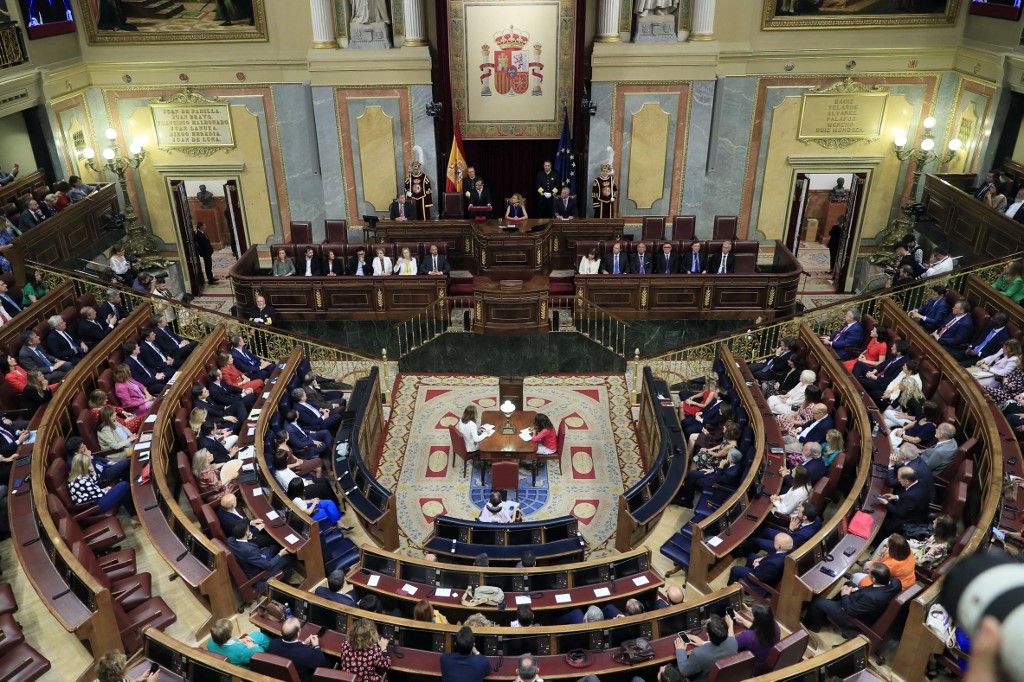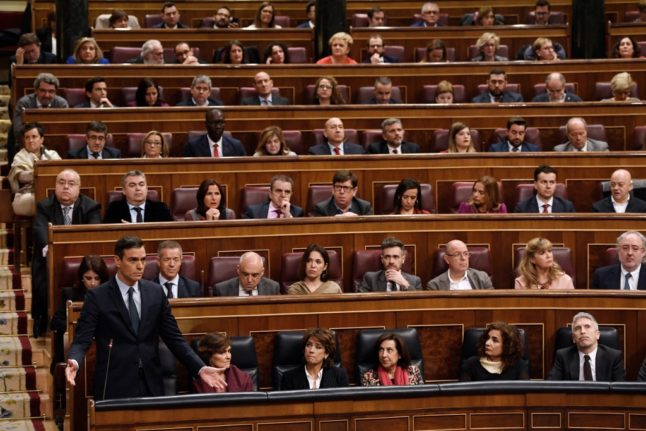In Spain, draft legislation becoming law and then finally coming into force can be a long and complex process that bounces drafts and amendments around between the government and both houses of Congress.
Often there are amendments made at various stages and slowing progress, such as with the housing law which saw hundreds of amendments proposed and made throughout 2022.
READ ALSO: Spain’s new housing law enters into force: Five key points you should know
As a result, draft bills can take often months and months to actually become law, and you’ll often hear of a law being ‘approved’ by one chamber only to be rejected by the other.
This means that there can be a significant amount of time between when you first hear about policy being floated by the government, to a bill being debated in the Spanish Congress, to when it is approved, and then, finally, coming into force.
Spain’s Asociación de Periodistas Parlamentarios estimates that the average bill takes around five months to be approved from start to finish, and they can take much longer when the proposed law is particularly controversial.
What’s the reason for the long delays?
Different laws
First of all, it’s important to understand the different types of laws in Spain. Government, opposition parties, and regional governments can all propose new legislation, but in reality, it is the elected government of the day driving the legislative agenda.
- Organic laws: these deal with fundamental rights and public freedoms; as well dealing with other issues specified by the Spanish Constitution including the Council of State, Royal Family, as well as states of alarm.
- Ordinary laws: rules that deal with the rest of the issues.
- Royal decree-laws: special laws used in cases of “extraordinary and urgent need” but cannot deal with issues such as fundamental rights or the basic institutions of the State, among others. The government approves them in the Council of Ministers and the Congress votes on their validation or repeal within a maximum period of one month, so they are pushed through a little faster.
- Legislative decree: new rules or changes approved by the government because the Spanish Courts delegate this power to create an articulated text (create new regulations on a matter) or recast already existing provisions in other rules.
How does this draft proposal actually become law?
The process
Government draft
We usually first hear about laws when the Spanish Cabinet presents a draft law and proposes it to Congress.
Technically speaking, before sending it to the Congress for approval, the government must first publish a public consultation online, explaining what the changes will be and how they will affect people. It must also write impact reports after consulting with the relevant ministries from the Council of State, the Fiscal Council or the Ministry of Finance and Public Administrations on the anticipated consequences of the legislation.
Presentation

After getting feedback on the proposed changes, the government must then formally present the proposed law to the Congress.
In Spain, like in many parliamentary democracies, there are two houses or chambers. Laws first go to the lower house, the Congress of Deputies of Spain (Congreso de los Diputados).
When sending the bill, the government must also supply a statement justifying why it is necessary and explaining its background with the reports supplied by the different government departments at the initial draft stage.
Then there is a period of 15 working days during which the parties in the Congress of Deputies can study the law and propose amendments.
Typically there are two types of amendments proposed: a total amendment that fundamentally disagrees with the bill and demands it be rewritten, or an amendment to a specific article within the bill.
Debate (Deputies)
Then the bill is debated in the Congress of Deputies. Often the government comes under serious attack from opposition parties at this stage, and all viewpoints are heard.
First, a member of the government explains the bill. Then the parliamentary groups proposing slight rewrites make their case, then those rejecting the bill and demanding a total rewrite, followed by a vote on the proposed changes, which must gain the support of a simple majority.
Amendments (Deputies)
Once amendments are formally lodged, a commission is set up to study the draft report and go through the text article by article, and a vote is held on the amendments.
Back to Government
Any proposed amendments that pass the committee stage and government budgetary costs, in other words, increase the cost of the policy or decrease the income it will generate, are sent back to the government and must be approved by La Moncloa – the home of the Spanish executive.
If the Prime Minister does not give a response within the next 15 days, the amendments are accepted.
The vote (Deputies)
After all that, the lower house must then vote on the amended bill before sending it on.
The session begins, again, with a presentation of the updated bill by a member of the government and testimony of a commission member who reviews the changes.
Then the Deputies vote, and in order to pass the bill, must be supported by a simple majority before being sent ‘upstairs’.
The Senate
The bill then goes up to the Senate, where there’s the possibility of a veto and new amendments can be proposed.
The Senate doesn’t go through entirely the same process however, as it receives the bill already pre-approved by the Deputies and it is thought (hoped) that a lot of the legal minutia has been ironed out in the lower house.
The bill is first passed onto the relevant Senate committees to be studied.
Senators can then propose their own amendments, and if so, they are sent back down to the Deputies where they must be approved (or rejected) by a simple majority. If you’ve ever watched the Spanish Congress live on TV, this is often when there can be some political fireworks and entertaining back and forth as the various parties debate the pros and cons of the bill.
But if they don’t have any changes, the bill is voted on and it can either be ratified by a simple majority, which would mean the bill is (finally) approved), or vetoed with an absolute majority.
If it does not pass, it goes back downstairs and the vote is repeated again two months later, by which time a simple majority becomes sufficient.
The King and BOE
Once approved, the law is formally sanctioned by the King (similar to getting Royal Ascent in the United Kingdom) and then published as official government policy in the Official State Bulletin or BOE.
Only then, months after the initial draft and tens if not hundreds of amendments later, once the bill has bounced around the Congress, does it become law and be enforced.



 Please whitelist us to continue reading.
Please whitelist us to continue reading.
Member comments